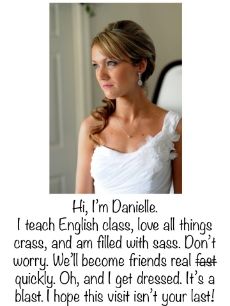Please excuse the following grainy images that my piece o' poop Droid took. I do not apologize for offending any Droid lovers. Mine would make a better brick than a phone. Not bitter at all.
Anyway, I digress. So, here's a preview of what our dual office is shaping up to be. Originally, we had two offices in adjoining rooms. Problem: I never used my office because I need company in the form of another human being or background noise from the TV. Solution: move in with Jeff and occupy his office. (Eventually, I will post "finished" photos of the office, but that's for another time.)
Today, let's check out my light plates, which were inspired by my sister-in-law's pinspiration. She made the cutest light plates for her baby's room!
After I painted the room yesterday, here was my train of thought (prepare yourself because I truly had an entire dialogue with myself):
"I hate my light plates."
"I usually spray paint them oil rubbed bronze, but it is as hot and humid as a dog's mouth out there. I also do not want to suffocate to death in the garage. Nope, no spray painting today."
"Oh, Jess used scrapbooking paper and Mod Podge to cover light plates."
"I don't feel like going to Michael's for scrapbook paper. What can I use instead?"
"I was planning to donate some really old books. What if I used pages from those?"
And then I had my lightbulb moment (pun intended).
So, I rummaged through the "to yardsale" piles and found a suitable book.
I didn't feel like scouring Jess's Pinterest for her tutorial, so I googled and found this one.
A few things:
- Working with old book pages is NOT easy. They tear like onion skin, and you're working with Mod Podge, which means they get wet. Work delicately. I imagine scrapbook paper is easier to work with because it is quite a bit thicker than what I was using.
- If you're a half wit like me, then you will trace the light plate and still screw it up. I found it was more useful to fold the paper over the edges and use the x-acto knife along the lines created by folding versus actually tracing and then I cut the holes by tracing the holes with the x-acto knife (versus tracing them with a pencil and then cutting them out with the x-acto knife). Again, the type of paper that I used might have been a contributing factor.
My Process:
- Collect all light plates.
- Find paper that you wish to use (I used old book pages since the plates are for our office. I'm also inherently lazy and cheap. I did not want to make a Michael's run or spend the money on scrapbook paper, especially if my project was a flop.)
- Flip the plates face down onto the paper.
- Fold the paper around the edges of the plate.
- Using an x-acto knife, cut along the outside of the lines created by folding. (I used the outside of the lines so that I could fold some over the light plate and not worry about cutting too small, which happened with the first one.)
- Keeping the light plate very still, cut out the holes using the x-acto knife. (If you're worried, you can first trace the holes with a pencil. I'm a rebel and cut out the middle man, haha, so punny.) Don't forget to make a little hole for the screw. The screw will hide any untidy edges right here, so this hole does not have to be neat.
- Flip the plate face up.
- Make sure the cut out matches the light plate.
- Using a foam brush or a paint brush, cover plate (don't forget the sides!) with Mod Podge.
- Act quickly (not at a slug's pace like me) and put the the cut out over top of the light plate.
- Smooth out the bubbles (if you're using snake skin for paper, be sure to carefully perform this step.)
- Allow 15-20 minutes to dry.
- After 15-20 minutes, shellac the crap out of the top with Mod Podge. You want to seal that sucker to the light plate. Feel free to add more than one coat. (You obviously have to let it dry between coats.) I used about two coats on every plate.
- Don't screw the plate back to the wall until it's completely dry.
Ta to the Da.
Geoffrey Chaucer now graces my light plates.
He should be so honored.
Geoffrey Chaucer now graces my light plates.
He should be so honored.
Here's my typical method:
White light plates are too boring to me now. This particular plate (like many on my main level) are spray painted oil rubbed bronze (can be found at Lowe's or The Home Depot). It's SO inexpensive compared to buying new, fancy plates! :)
So, I hope you're inspired by my inspiration that was inspired by Jess's pinspiration. Feel free to comment with any questions or suggestions.






















.jpg)

No comments:
Post a Comment
Feel free to throw some witticisms my way.